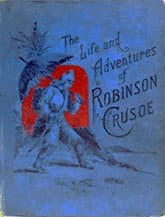Robinson Crusoe
Critique • Quotes • Text • At the movies
 1890 edition
1890 editionAlso known as
The Life and Strange Surprising Adventures of Robinson Crusoe of York, Mariner
First publication
1719, England
Literature form
Novel
Genres
Literary, adventure
Writing language
English
Author's country
England
Length
Approx. 140,000 words
Not one of my desert island books
The biggest mystery about Daniel Defoe's Robinson Crusoe may be why it is so well known, so fondly remembered, so enshrined in our culture.
As novels go, this is one dreadful piece of work. The writing is amateurish, the narrative poorly paced, the plot implausible and the characters sketchy, if not outright abhorrent. Not to mention its racism and colonialism, which we'll get to later.
So why has it been so popular for so long?
For one thing, it is often cited as the first English novel (though the French and Spanish had produced novels over a century earlier) and as such it is bound to be somewhat important in literary history.
Suspicions are that most readers have been exposed to Defoe's story in only abridged and illustrated editions, in which the above problems are smoothed out or expunged altogether, or through the many literary or cinematic take-offs on the story. Perhaps most people haven't actually read Defoe—they only think they have. I can't see many folks of the modern era struggling through the awful original text and coming away enthralled.
Robinson Crusoe's sojourn on the deserted island was intended by Defoe to be only the greatest among many adventures his protagonist experiences in his world travels. In the novel, before he is stranded on the island, Crusoe has already embarked on trading ventures around Africa, been enslaved by a Moorish pirate, escaped on a small boat in the Atlantic, and become a plantation owner in Brazil. After rescue from his island ordeal, he becomes engaged in adventures in France of all places, where he is attacked by wolves. In the novel's sequel, The Further Adventures of Robinson Crusoe, our supposed hero revisits the island to set right the community he had established there but spends most of his time sailing around the eastern world, fighting pirates and local authorities, travelling through Asian countries to ridicule their cultures and destroy their non-Christian religions—and making profit wherever he can, including by selling opium to the Chinese.
Excruciating detail
But it is the island story that dominates the original novel and our collective memory of Robinson Crusoe. The character sets out to Africa on behalf of a Brazilian consortium of plantation owners to get slaves but a series of misadventures lands him, the only survivor of a shipwreck, on a shore somewhere off the northeast coast of South America. The rest of the story about how he establishes shelter, finds food, fends off cannibals and marauding Spaniards, and befriends a supposed savage he names Friday (and requires to call him "Master" in return) is well known.
This part of the book is filled with excruciating detail. Crusoe is on the island for twenty-eight years, most of which is spent watching crops grow and making lists—lists of his provisions, lists of his daily routines, lists of how many natives he's killed....
Defoe's story was said to be inspired by the example of a Scottish sailor Alexander Selkirk who was marooned on a Pacific island for four years. Too bad Defoe did not adopt the same timeframe, although this would not have given Crusoe enough time to build a miniature empire on the island.
Despite all this criticism though, the book is still worth reading to get an idea of how some people thought in those days. And for historical reasons: to see how the novel form developed from this early British attempt.
Also, bear in mind that the adventure was not only tremendously exciting for the reading public in Defoe's time but it laid down a template that's been followed or adapted by an entire genre of literature, films and cartoons since then, usually more competently produced and without the morally odious context.
So there are sound reasons for trying Robinson Crusoe. But it is not one of the books I'd want on a desert island.
— Eric
Critique • Quotes • Text • At the movies

